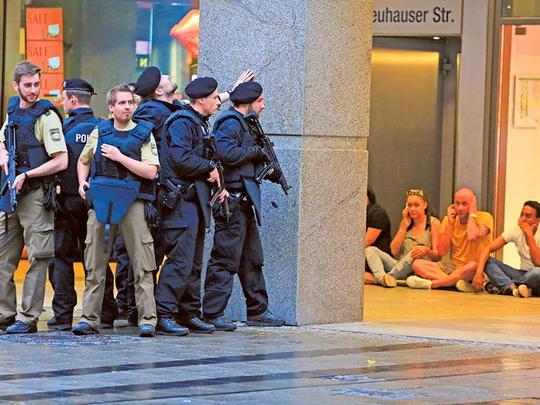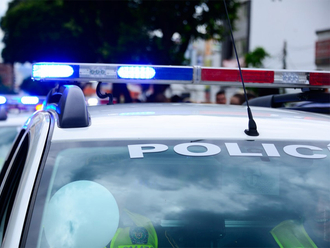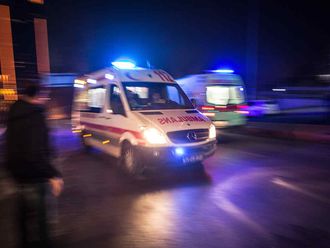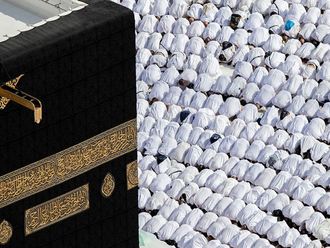
Munich: German Chancellor Angela Merkel convened an emergency meeting of her security cabinet on Saturday as police and intelligence services try to identify the motives behind a teenage gunman’s rampage in Munich that left 10 people dead, including the killer.
The assailant shot dead nine people at a shopping mall in the north of the city before turning the gun on himself after a siege lasting several hours into the early hours of Saturday morning. Police in Munich identified the suspect as an 18-year-old German-Iranian.
At least 16 people, some of them children, were wounded in the attack that caused mass panic as authorities shut down public transport services and the city went into lockdown. Most of the casualties were young people aged 15 to 21, Bavarian public television said.
Police issued a terror alarm and told residents to stay indoors. The main train station was evacuated as federal police and special forces joined in the manhunt. More than 2,000 officers were deployed in Germany’s third biggest city, according to N-TV.
Germany has so far been spared the type of organised terrorist attack that killed hundreds in Paris, Nice and Brussels, though the authorities have repeatedly warned that the threat remains high. Tensions have risen since mass sexual assaults in Cologne and other cities on New Year’s Eve, and an attack on Monday near the Bavarian town of Treuchtlingen in which two people were critically injured with an axe on a train by a 17-year-old Afghan refugee, whom police later shot and killed.
The alleged perpetrator in Munich, whose body was found a short distance from the scene, was most likely acting alone, Hubertus Andrae, the head of the city’s police department, said at a press conference during the night. He ruled out accomplices after earlier reports suggested several shooters were on the loose. “Whether this was a terror attack or someone running amok will be determined by the motive,” said Andrae, declining to draw a parallel to Monday’s assault. The shooting “leaves us sad, speechless and our thoughts are with the families and friends”, he said.
Three Turkish citizens were among those killed, Turkish Foreign Minister Mevlut Cavusoglu said on Saturday. The three Turks were named as Sevda Dag, Can Leyla and Selcuk Kilic by the minister on NTV television. Greece said one of its citizens had also been killed, and three Kosovans were confirmed dead in the attack by their country’s foreign ministry.
US President Barack Obama expressed condolences in remarks at the White House on Friday. “Germany’s one of our closest allies so we are going to pledge all of the support that they may need in dealing with these circumstances,” he said.
French President Francois Hollande expressed his condolences and support for Germany after the Munich attack, calling it an “ignoble act aimed at spreading horror in Germany”. Prince Albert of Monaco sent a letter to German Chancellor Angela Merkel, promising “the solidarity of my country in the face of this cruel ordeal.”
In Berlin, the Federal Security Council — including Merkel, her chief of staff Peter Altmaier, Foreign Minister Frank-Walter Steinmeier, Defence Minister Ursula von der Leyen and Interior Minister Thomas De Maiziere — met to assess the situation.
The attack caught the government off guard, with many cabinet members already on vacation. Merkel wasn’t able to attend a crisis meeting on Friday at the chancellery, while De Maiziere was on a plane to the US at the time, German news agency Deutsche Presse-Agentur reported. He broke off the trip to return to Berlin.
“We grieve for the victims and our thoughts are with their next of kin,” De Maiziere said in an emailed statement.
Merkel has come under intense pressure over her open-doors refugee policy that resulted in about a million people claiming asylum in Germany last year, the vast majority arriving in Bavaria and many transiting Munich, the state capital. Her party and personal approval ratings tumbled and the anti-immigration Alternative for Germany party made significant gains in state elections, but the trend has since reversed as a European Union deal with Turkey and the closure of the Balkan route slowed refugee arrivals to a trickle.
Members of Merkel’s Christian Democratic Union-led bloc urged against jumping to conclusions about the attack’s motives. Stephan Mayer, a member of Merkel’s Christian Social Union Bavarian ally party that was most critical of her refugees policy, called for “cool heads” and no “false speculation.” Volker Kauder, the CDU/CSU caucus leader, urged against the “brutalisation of speech” that can lead to a spiral of violence. “We still don’t know what drove the perpetrator to commit these murders,” Kauder said in a statement. “Regardless of his motives and his personal disposition, we have to do more to ensure that hate and violence do not spread through our society in general.”
The shooting occurred at the Olympic Shopping Centre, located about 5km northwest of the city centre. The mall, built for the Munich Olympics in 1972, is close to the site where eight armed Palestinian nationalists took hostage and killed 11 members of the Israeli team during the games. The nearby Olympic Park is a major tourist attraction in Munich, which draws millions of visitors every year. Many had travelled there to attend the Tollwood summer festival that was subsequently cancelled amid the mayhem.
Authorities organised emergency accommodation for people stranded in the city as public services resumed in the early hours of Saturday. Government buildings and mosques stayed open all night to offer refuge, and the Twitter hashtags #offenetuer and #open door were used to guide people seeking a place to stay. The shooting, which happened just before 6pm local time, came on the fifth anniversary of the mass shooting and bombing in Norway by Anders Behring Breivik that left 77 people dead.












